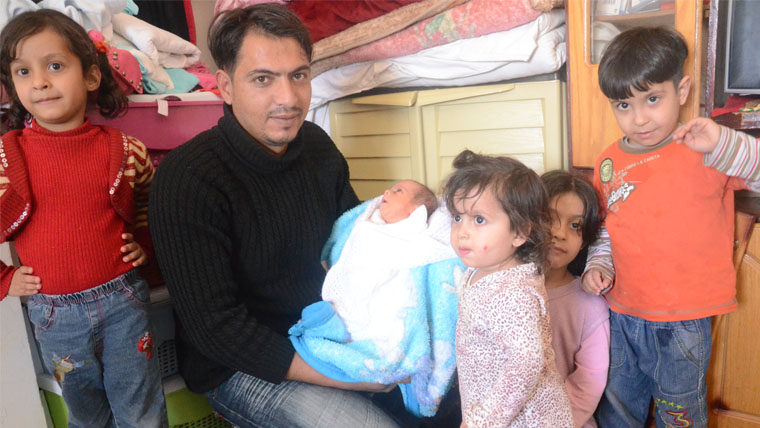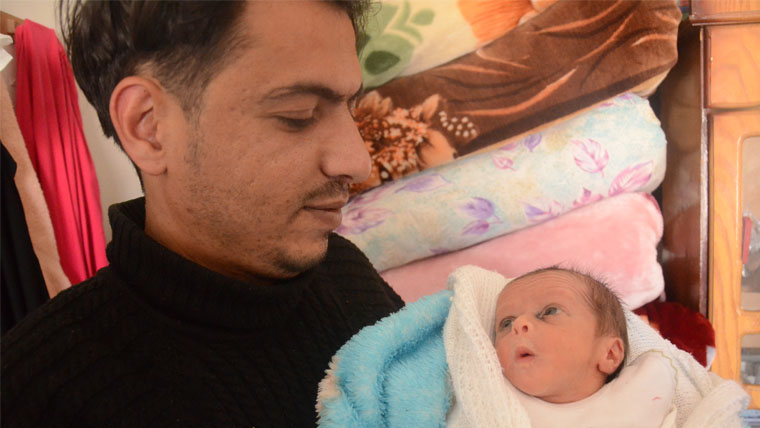'There's no way to describe the horrors we've seen': a Syrian refugee family's plight in Jordan

By Mike Bailey, World Vision
“We have used up all our tears, so now we are smiling,” says Abdullah, a father of five: 7, 6, 3, and 2-years old. But his smile is brittle if you look into his eyes. He holds his new born son gently in one arm and points in turn to his other four children. Abdullah’s wife, Akida, looks tired. She had a caesarean birth a week ago but is already home. The family had to pay high hospital fees for the birth and could not afford for her and the baby to stay in the hospital even though the baby had a low birth weight of only 1.7kg.
This is my introduction to Syrian refugees living in Jordan, in the north western city of Irbid. Abdullah’s family a share two rooms with his widowed sister, Wafa, 22, in a building constructed as shops and offices that is now home to some 65 refugee households. Across the corridor, Emad* lives in an identical and small space, no larger than 50 square meters, with his extended family of 19 adults and 6 children—25 people sharing one toilet and a hand-washing basin for all their bathroom needs. Bedtime must be a struggle. Emad arrived with his wife and three children just two weeks ago, “running for our lives,” he says. He won’t elaborate, he just says, “there is no way to describe the horrors they have seen.”
Layer after layer of problems
It isn’t only because you feel like crying that listening to the refugee’s stories is like peeling an onion. There is layer after layer of problem. For Abdullah his immediate fears include, how to pay the monthly rent and electricity, how to afford drinking water and food when it costs four to five times as much as it cost at home. Here, he has no job. In Syria he worked as a shoemaker. Wafa has had no success job hunting either. There was already high unemployment in Jordan before 100,000 Syrian refugees households arrived. One hundred thousand new job seekers.
Abdullah worries that although he and his wife have identity papers, their children have none. Their family’s papers were burned in Syria and then they fled before they were able to complete the replacement process. As with many refugee stories the details are murky. Details leak out as we chat over tea.
In Emad’s flat, I hear that the eldest daughter, Amira*, 6, has a special gift. She can tell the difference between soldiers of the two sides in the Syria conflict and knows the safe way to talk to each. She warned her father not to talk to one group saying, “they might shoot both of us.” It was while describing this she mentioned that soldiers had burned their house down.
Families cramped or broken
Life as a refugee can be a dull experience for children. Emad’s three children who just arrived are bored without toys. There is just a pack of cards to play with. They watch cartoons on television in an atmosphere of cigarette smoke and adult talk. The boys wriggle and wrestle, sparking with nervous energy. It’s time they went to school but there are costs many parents cannot afford even though the schooling is assisted by humanitarian agencies. Places can be difficult to get in crowded Jordanian schools. In many case, many refugees lack information about how to enroll their children.
People don’t want to be identified for fear of what may happen to their relatives back in Syria. One mother I listened to has not heard from her 20-year-old son for three and a half months. She cannot speak about him. She turns away and busies herself with washing clothes in the cramped kitchenette when asked. In this same small space food preparation and dishwashing for 25 people has to be done. Another woman says she fears for the safety of her father who is under arrest in Syria.
The men seem tense, frustrated. They watch news from Syria all the time and although the situation is bad and it is easier to watch it on TV than live through it in person, they dream of going home.
Plans to return are a distant dream
For the meantime, plans to return to Syria can only be dreams for most refugees. Their future is a monthly struggle to survive, to meet the bills and other unavoidable costs; to get their children into school, and to cope with a rising sense of hopelessness. The international community, INGOs like World Vision, the UN, the Jordanian government and donor countries, are all working to respond as the situation that threatens to rocket out of control.
World Vision’s main concern is the children and that the international response is keeping pace with the needs of the growing refugee population.
World Vision is committed to responding to the needs children and families affected by the crisis in Syria, wherever they are. We are assessing the situation and planning to start work in Jordan.
Without additional help, the chances of protecting children from the additional effects of trauma as a refugee are as thin as Abdullah’s smile.

Please consider donating to the Syria Appeal, and help feed, clothe and shelter Syrian children.